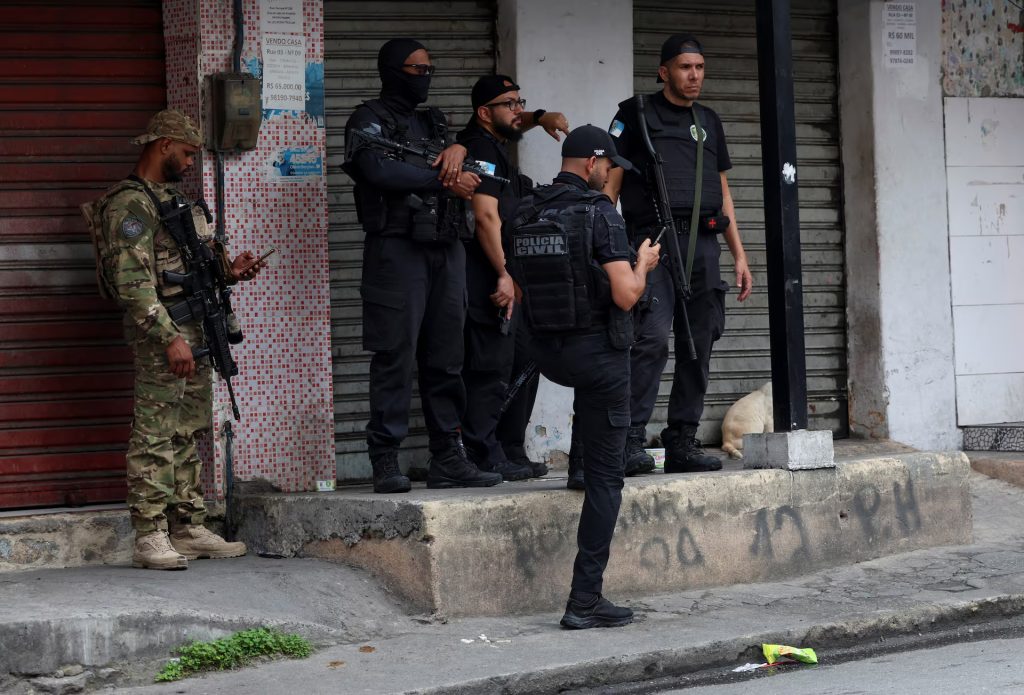Rio’s Inferno: A Conservative Reckoning with Narco-Terrorism Under Lula’s Watch
By Hotspotnews – October 29, 2025
In the shadow of Christ the Redeemer, where tourists once marveled at Brazil’s vibrant spirit, the streets of Rio de Janeiro erupted into a scene straight out of a dystopian thriller yesterday. What began as a pre-dawn police operation to dismantle the iron grip of the Red Command drug cartel—a notorious syndicate born from the ashes of leftist guerrilla movements—quickly devolved into urban warfare. Over 2,500 officers stormed the favelas of Alemão and Penha, only to face a hail of bullets, burning barricades, and, in a chilling first for Brazil, drone-delivered explosives. By midday, the toll stood at least at 64 dead, including four brave police officers, with 81 arrests and hundreds of thousands of innocent residents trapped in the crossfire. Rio’s governor, Cláudio Castro—a steadfast ally of former President Jair Bolsonaro—didn’t mince words: “The city is effectively at war.”
This isn’t just another skirmish in Brazil’s endless battle against organized crime; it’s a stark indictment of the failures festering under President Luiz Inácio Lula da Silva’s socialist regime. For conservatives who value law, order, and the unyielding defense of civilized society, yesterday’s bloodbath in Rio serves as a clarion call: Weak-kneed policies that coddle criminals and undermine authority are not just ineffective—they’re deadly.
The Siege: From Routine Raid to Battlefield
The operation, dubbed “Containment,” targeted the Red Command, Brazil’s oldest and most entrenched cartel, which controls roughly 60% of Rio’s territory and has long masqueraded its narco-empire with pseudo-political rhetoric rooted in far-left ideology. Founded in the 1970s by imprisoned Maoist militants, the gang’s name alone—”Comando Vermelho,” or Red Command—evokes the red flags of communism that have haunted Latin America for decades. Yesterday, as police helicopters thundered overhead and armored vehicles rumbled through narrow alleys, the cartel’s response was as savage as it was sophisticated. Gang members torched buses and cars to block advances, ambushed officers with automatic weapons, and unleashed first-person-view (FPV) drones laden with grenades—a tactic more akin to jihadist insurgents than street thugs.
Eyewitness accounts paint a picture of hellish chaos: Smoke choked the sky, gunfire echoed like thunder, and families huddled in their homes as stray bullets pierced concrete walls. One local resident in the Vila Isabel neighborhood described waves of robberies and shootouts ripping through civilian areas, even as military police stood vigilant but outnumbered. By evening, the death count had climbed toward 80, with over 100 injured—a grim milestone that human rights groups are already decrying as excessive force, while conveniently ignoring the cartel’s role in igniting the inferno.
Governor Castro, a conservative bulwark in a nation adrift under Lula’s Workers’ Party (PT), laid bare the betrayal from Brasília. Despite three desperate pleas for federal military reinforcements, Lula’s government offered only token gestures: a handful of prison beds and vague funding promises. “Rio is alone in this war,” Castro declared, echoing the frustrations of a state government forced to shoulder the burden of a national crisis. This isn’t governance; it’s abandonment. The PT’s historical dalliances with such groups—whispers of ideological sympathy and outright corruption—have eroded trust in institutions and emboldened the very monsters now bombing police with consumer tech.
The Conservative Imperative: Crush the Cartels, Restore Order
From a conservative lens, this tragedy isn’t an aberration but the predictable fruit of progressive delusions. Lula’s return to power in 2023 promised “social justice,” yet it has delivered only social carnage. Rio’s police, long criticized for their heavy hand, are the thin blue line between anarchy and order—a line that Bolsonaro’s administration bolstered with decisive reforms, including expanded self-defense rights and anti-crime task forces. Under his watch, homicide rates plummeted; under Lula, they’ve surged, fueled by a federal reluctance to confront the narco-leftist nexus head-on.
Make no mistake: The Red Command isn’t just a criminal enterprise; it’s a terrorist outfit with Marxist roots, now wielding drones like a paramilitary force. Conservatives have long warned that appeasing such entities—through lax sentencing, open borders for smuggling routes, or politicized policing—invites escalation. Yesterday proved it. Drones dropping explosives? That’s not “community policing” territory; that’s a declaration of war that demands a scorched-earth response: Declare these gangs domestic terrorists, unleash the full might of the armed forces, and strip away the judicial shields that let kingpins walk free on technicalities.
This fight transcends Brazil’s borders. As cartels like Red Command export violence northward—flooding U.S. streets with fentanyl and migrants coerced into servitude—American conservatives must stand in solidarity. President Trump’s border wall wasn’t just about Mexico; it was a bulwark against the hemispheric chaos sown by leftist regimes from Caracas to Rio. Lula’s Brazil, cozy with Maduro’s Venezuela, exemplifies how socialism breeds not equality, but empires of death.
A Path Forward: Back the Warriors, Not the Weak
As the smoke clears over Rio’s favelas, the survivors—police heroes who charged into the fray, families shielding children from stray rounds—deserve more than platitudes. They deserve victory. Conservatives worldwide should rally behind leaders like Castro and Bolsonaro, who understand that true compassion means protecting the innocent by eradicating threats, not negotiating with them. Demand federal intervention, not excuses. Elect strongmen who prioritize citizens over criminals. And remember: In the war for civilization, hesitation is surrender.
Yesterday, Rio bled. Today, let it inspire resolve. Tomorrow, may it stand reclaimed—as a beacon of order in a world too often dimmed by disorder.
photos by Reuters, Aline Massuca
